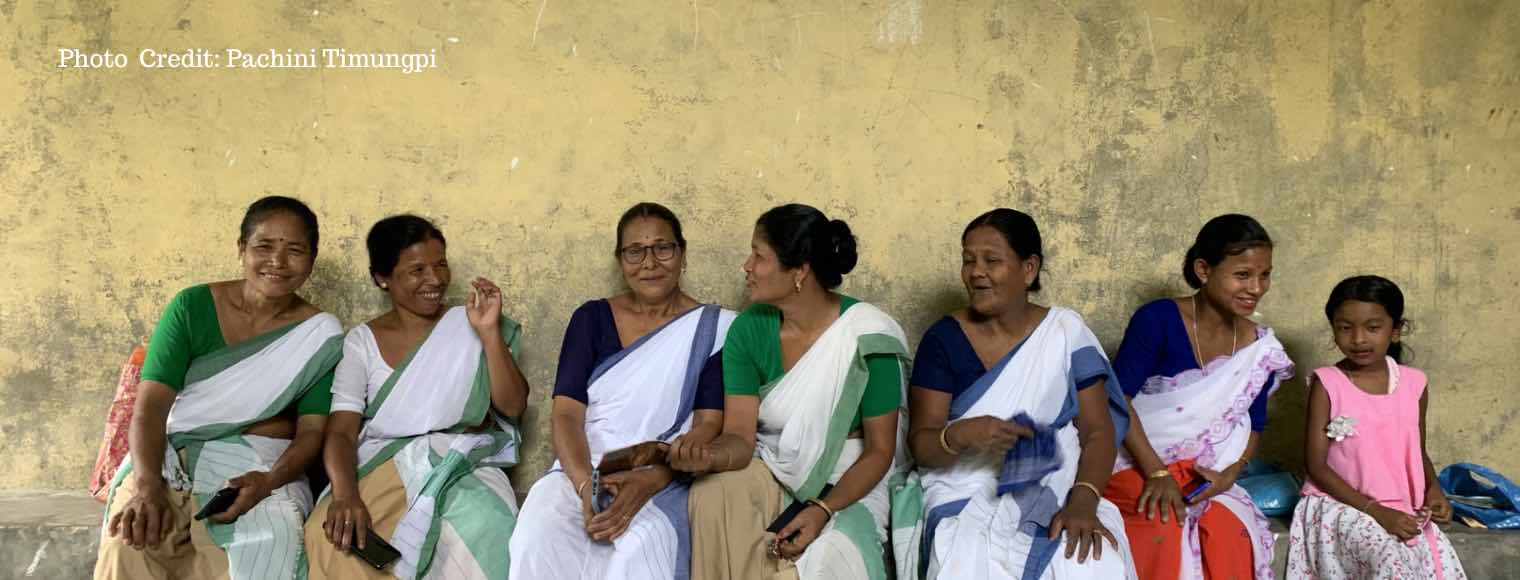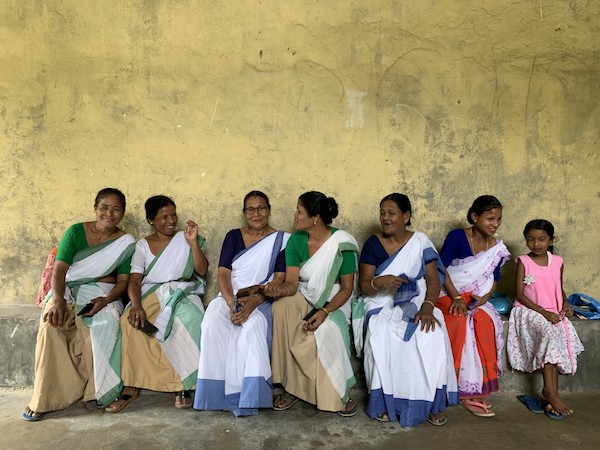
Abstract
This article underscores the issues of Asha Workers in Assam and the importance of efforts towards fortifying Assam's healthcare system. ASHA workers are indispensable to the healthcare framework of Assam, but they are confronting substantial hurdles, including low remuneration, inadequate resources, and demanding working environments. However, amidst these challenges, ASHAs assume a pivotal role in dispensing healthcare to underserved populations, particularly in remote and inaccessible regions. Understanding the plights and challenges they face is crucial for crafting targeted interventions aimed at bolstering their capacity and resilience. Addressing issues such as low remuneration, resource scarcity, and adverse working conditions requires a nuanced approach that considers the contextual intricacies of Assam's healthcare landscape. Moreover, fostering collaboration among stakeholders and implementing tailored support mechanisms is imperative for enhancing the effectiveness and sustainability of ASHA programs.
The ASHA program, introduced in 2006, sought to foster engagement with marginalised communities, facilitating their access to healthcare services at the grassroots level. This sought to bridge the gap between underserved populations, who typically do not seek healthcare within traditional facilities, and essential health services provided within their communities. This has also resulted in ASHA workers playing a pivotal role in the successful eradication of polio and in mitigating maternal mortality rates by facilitating childbirth in safer conditions.
ASHAs are recognised for the dissemination of health-related knowledge, utilising methods such as home visits and counselling sessions to encourage women to follow antenatal care protocols and opt for hospital delivery. (Saprii et al., 2015) ASHAs play a vital role in facilitating immediate and convenient access to essential health supplies for rural populations. These supplies include Oral Rehydration Solution (ORS), contraceptives, a basic set of ten drugs, as well as equipping them with health communication kits and other Information, Education, and Communication (IEC) materials tailored for village settings. ASHA is allocated to each village at a ratio of one per 1000 population. However, in geographically challenging areas such as tribal, hilly regions, adjustments may be made to this norm, allowing for one ASHA per habitation based on workload considerations.

Navigating the Challenges of ASHA Workers in Assam
Currently, the state of Assam hosts a substantial workforce comprising 32,546 ASHAs dedicated to addressing the healthcare needs of their communities. The state employs 2,877 ASHA Supervisors who are responsible for managing teams of 10-12 ASHAs each (Health and Family Welfare, NHM). At the Block Primary Health Centre (BPHC) level, there are 149 Block Community Mobilisers deployed to assist ASHAs and ASHA Supervisors. ASHAs are assigned over 70 different activities, for which they are eligible to receive incentives upon successful completion. Additionally, ASHAs can claim a routine monthly incentive of Rs. 2,000 for eight specific activities designated by the Government of India.
Furthermore, the State Government provides an additional Rs. 1000 incentives for 13 essential activities. The ASHA workers and assistants in the state have engaged in prolonged protests, advocating for an increase in their wages and the regularisation of their employment status. In Guwahati's Chachal area on November 10, 2023, a significant gathering of ASHA workers from Assam convened in a large protest. They articulated their grievances, calling for the fulfilment of several demands, including the provision of consistent monthly salaries and a reduction in their workload. Specifically, the ASHA workers advocated for a fixed monthly remuneration of no less than Rs 15,000 and a decrease in their working hours. (Hub Network, 2023). They assert that the state government needs to adequately address their concerns or take tangible steps to resolve the challenges encountered by these essential workers, who play a pivotal role in ensuring the delivery of health care and various other benefits to communities at the grassroots level. (The Sentinal, 2024)
In the diverse state of Assam, with its varied communities and districts, unique challenges emerge at the micro level. ASHA workers face notable obstacles in fulfilling their roles as healthcare providers, particularly concerning transportation logistics and service disruptions at remote health facilities. In instances where Community Health Centers (CHCs) or Primary Health Centers (PHCs) are situated far from their area of operation, ASHA workers often cover transportation costs using their pocket expenditures drawn from their modest incentives. This puts a strain on their finances since their incomes are already low, and they need help to cover basic expenses, let alone pay extra costs for transportation to their work location. A study by (Manjunath et al., 2022) also highlights that ASHAs experience significant physical and financial strain due to inadequate transportation options for fulfilling their daily duties. They often resort to using personal funds to hire auto rickshaws for emergency travel and to meet other work-related obligations.
ASHAs need more resources to improve their performance of duties. They have complained about the lack of smartphones, Internet connectivity, and adequate funds for monthly mobile phone recharges and refreshment snacks for meetings.
An additional issue underscored relates to the geographical landscape of Assam like Dhemaji, which frequently experiences flooding. Despite the challenges posed by these floods, ASHA workers have to continue to conduct household visits. They encounter flooded roads, which can become impassable, especially during heavy rainfall. Navigating through these bad road conditions, compounded at times by continuous rainfall, puts ASHA workers at an increased risk of health hazards.
In Assam, recognised for its significant tea cultivation industry, the tea garden community represents one of the most marginalised and excluded social groups within the region. Disparities in access to information persist between this community and others, leading to significant gaps in healthcare service delivery. An ASHA worker here plays a pivotal role as an intermediary, bridging the gap between these marginalised communities and healthcare facilities. ASHAs tend to reach out more to groups of people who usually do not get much attention from regular healthcare services. This includes poor people living in rural areas and women from vulnerable communities (Agarwal et al., 2019). However, with the excessive workload and burdens, they find themselves needing to be more adequately compensated for their efforts. Insufficient compensation for their efforts may affect the long-term performance of ASHAs. ASHAs from economically disadvantaged backgrounds, with the monetary compensation they receive serving as the primary and often sole source of income for their families. Monetary incentives constitute a significant motivating factor for their continued engagement. However, instances of irregular or delayed payments, personal expenditure on travel and other work-related expenses, and encounters with discriminatory treatment in the workplace are common challenges they confront (Manjunath et al., 2022). Additionally, the evolving landscape of healthcare programs and services, coupled with advancements in technology and information management, necessitates monitoring and documentation. However, a significant portion of ASHA workers, many of whom still need to possess a high level of formal education, need help comprehending and effectively implementing these concepts.

The Way Forward
Several research studies on Community Health Workers (CHWs) indicate that, in addition to ensuring sufficient financial remuneration for their contributions, providing non-monetary forms of assistance like housing, childcare support, and acknowledgement during significant events could significantly boost ASHAs' satisfaction in executing their diverse responsibilities. Initiatives similar to Indonesia-based health communication, which resulted in motivating Indonesia's Community Health Workers (KADERS) by recognising the work and appreciating in public as “volunteers who work without compensation for our children in our village for the sake of the future” (Elder, 1992). A comprehensive reimbursement initiative necessitates a nuanced approach. The provision of reimbursement for out-of-pocket expenses demands careful consideration and implementation. Various strategies must be meticulously tailored to accommodate diverse challenges in the local context. Efforts aimed at enhancing local health services and systems should involve respectful engagement with diverse stakeholders while also prioritising population-level effectiveness (Perry, 2018). This should entail implementing robust mechanisms for ongoing performance monitoring and adaptation, which respond dynamically to observed performance and changing circumstances.
References
Agarwal, S., Curtis, S.L., Angeles, G. et al. The impact of India’s accredited social health activist (ASHA) program on the utilisation of maternity services: a nationally representative longitudinal modelling study. Hum Resour Health 17, 68 (2019). https://doi.org/10.1186/s12960-019-0402-4
Bhattacharyya, K., Winch, P., Leban, K., & Tien, M. (2001). Community Health Worker Incentives and Disincentives: How They Affect Motivation, Retention, and Sustainability.
https://chwcentral.org/wp-content/uploads/2013/07/Community-Health-Worker-Incentives-ad-Disincentives-How-They-Affect-Motivation-Retention-and-Sustainabilty.pdf
Dagar, N., Bhardwaj, U., & Bansal, P. (2017). The Problems Faced by ASHAs (Accredited Social Health Activists)—A Qualitative Study. JoNSP, 7, 25-30.
Elder J, Reis T, Satoto, Suwandi R. Healthcom Indonesia. The use of radio spots to improve the performance and motivation of Kader. Hygiene. 1992;11(4):21-5. PMID: 1468785.
Manjunath U, Sarala R, Rajendra D, et al. Assessment of Workload of ASHAs: A Multi-stakeholder Perspective Study for Task-sharing and Task-shifting. Journal of Health Management. 2022;24(1):62-73. doi:10.1177/09720634221079084
